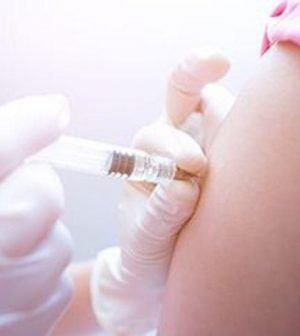- Recognizing the Signs of Hypothyroidism
- 10 Strategies to Overcome Insomnia
- Could Artificial Sweeteners Be Aging the Brain Faster?
- Techniques for Soothing Your Nervous System
- Does the Water in Your House Smell Funny? Here’s Why
- Can a Daily Dose of Apple Cider Vinegar Actually Aid Weight Loss?
- 6 Health Beverages That Can Actually Spike Your Blood Sugar
- Treatment Options for Social Anxiety Disorder
- Understanding the Connection Between Anxiety and Depression
- How Daily Prunes Can Influence Cholesterol and Inflammation
Heart Issue Spotted in a Few Young COVID Vaccine Recipients; Experts Say Shots Still Needed

A small number of teens and young adults have experienced heart inflammation after receiving mRNA COVID-19 vaccines produced by Pfizer and Moderna, the U.S. Centers for Disease Control and Prevention reports.
The CDC’s Advisory Committee on Immunization Practices (ACIP) said that it has received “relatively few” reports of the condition, known as myocarditis, among younger people who received the vaccine, but the agency said it plans to investigate the apparently rare effect.
The American Heart Association released a statement on Sunday saying that mRNA vaccines are still the right choice for young people.
“We remain confident that the benefits of vaccination far exceed the very small, rare risks. The risks of vaccination are also far smaller than the risks of COVID-19 infection itself, including its potentially fatal consequences and the potential long-term health effects that are still revealing themselves, including myocarditis,” the AHA said in its statement.
Myocarditis is inflammation of the middle layer of the wall of the heart muscle, which can weaken the heart and disrupt the electrical impulses that keep the heartbeat steady. Severe myocarditis can lead to heart failure, abnormal heartbeat and sudden death.
Safety data gathered from vaccine recipients has shown that myocarditis seems to occur predominantly in teens and young adults, typically within four days of vaccination and more often following the second dose, according to a statement from ACIP. It also affects males more often than females.
“Most cases appear to be mild, and follow-up of cases is ongoing,” the ACIP statement said.
The AHA also noted that myocarditis usually results from a viral infection, which doesn’t jibe with the way the COVID vaccines work.
“It is yet to be determined if these cases have any correlation to receiving a COVID-19 vaccine, especially since the COVID-19 vaccines authorized in the U.S. do not contain any live virus,” the AHA statement said.
Other medical experts agreed that the situation doesn’t make immediate and obvious sense.
“It may simply be a coincidence that some people are developing myocarditis after vaccination,” Dr. Celine Gounder, an infectious disease specialist at Bellevue Hospital Center in New York City, told the New York Times. “It’s more likely for something like that to happen by chance, because so many people are getting vaccinated right now.”
The AHA said anyone who has the following symptoms after getting the vaccine should seek medical care immediately:
- Chest pain
- Shortness of breath
- Abnormal heartbeat
- Severe headache
- Blurry vision
- Fainting or loss of consciousness
- Weakness or sensory changes
- Confusion or trouble speaking
- Seizures
- Unexplained abdominal pain
- New leg pain or swelling.
As of Monday, nearly 286 million doses of COVID-19 vaccines had been administered in the United States and more than 130 million Americans are fully vaccinated, according to the CDC.
By mid-May, the coronavirus had infected more than 3.9 million children and sent more than 16,000 to hospitals, according to a report in the Times. About 300 children have died from COVID, making it one of the top 10 causes of death in children during the pandemic.
More information
Here is the statement from the Advisory Committee on Immunization Practices.
SOURCES: Advisory Committee on Immunization Practices, statement, May 17, 2021; American Heart Association, statement, May 23, 2021; New York Times
Source: HealthDay
Copyright © 2026 HealthDay. All rights reserved.










